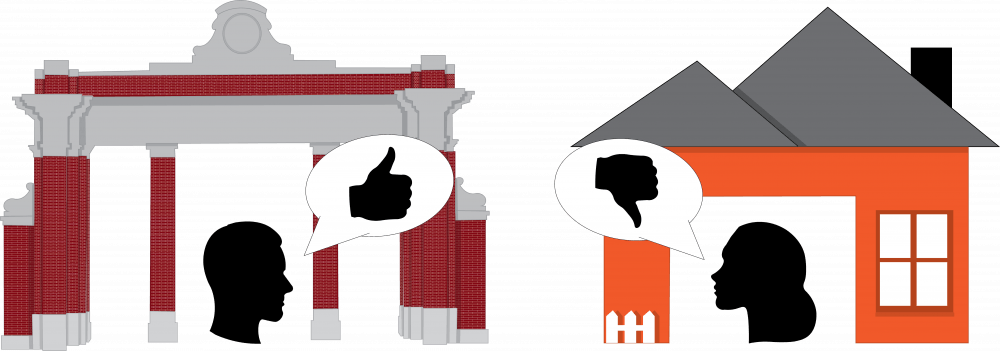Kelsey Perkins-Macgregor describes her hometown Blanchester as “so small it would technically be a village.”
“We’re probably the only Democrats in the entire town,” Perkins-Macgregor, a senior studying media arts, said in an email. “I grew up surrounded by people that were very against things like saying ‘Happy Holidays,’ let alone anything more impactful than that.”
Athens has become a safe haven for students with a more liberal point of view than people in their small rural hometowns.
The city has a history of social movements and unorthodox communities which influences Ohio University students politically, Larry Burmeister, a professor of sociology said.
“One of the really valuable things of the college experience is being exposed to these other issues that a student might not have encountered in their personal life,” he said.
However, Athens is also home for conservative students.
Casey Kinsey, a senior studying marketing, said he considers himself a conservative because he wants the U.S. government to stay out of people’s business, especially when they don’t have the constitutional power for certain regulation. He also doesn’t want tax increases, wasteful government spending or strict gun regulations.
However, Kinsey’s friends come from both sides of the political spectrum.
“We have been in conflict over things like gun rights and health care,” he said. “I always listen to the other side, but I stand strongly by my beliefs.”
Most of the debates he has with liberal friends and family members take on a lighter tone because remaining in their lives matters more to him, Kinsey said.
Perkins-Macgregor identifies as a bisexual woman and said it’s difficult for her to not have liberal beliefs since so many current political discussions are intertwined with the struggle for equal rights.
“It’s a complete clash of ideologies (between my family and the village),” she said. “Confederate flags are everywhere, we have more churches than restaurants and my graduating class was 100 percent white.”
Charlie Folk, a senior studying games and animation, said he considers himself a leftist and has always held those political views. During high school, he stumbled upon many different opinions on social media.
“It helped me learn a lot more that isn’t presented in a small town,” he said.
Every debate has more than one side and the supporters of each deserve to have their opinions heard. Folk said he tries to be unbiased by hearing out the other person’s stance, but he wants the same courtesy in return.
Burmeister said people are less likely to change their mind on a political issue if they’ve put a decent amount of time and effort into cultivating their opinion. He believes the best route is to not talk about politics with people who you know will disagree with you.
Perkins-Macgregor said she has talked to many people back home about politics and human rights. She said her main findings concluded they were only concerned with policies that had a direct impact on them such as whether a candidate would raise taxes.
“We all learned a long time ago that we’re not going to sway each other,” she said.
Her graduating class consisted of 100 students, most of which Perkins-Macgregor has known since kindergarden. Disagreements with these friends just lose their intensity because it isn’t worth losing that person over, she said.
“There comes a point in the middle of an argument that you remember when the other one ate Play-Doh and then arguing just seems pointless,” Perkins-Macgregor said.






